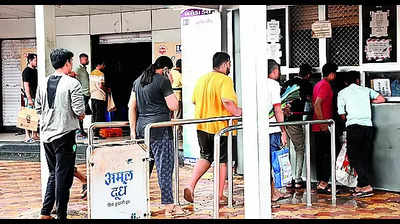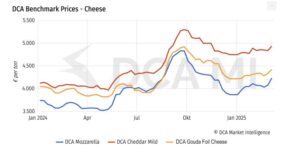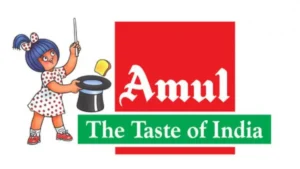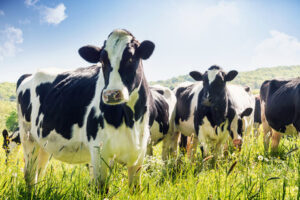

Vadodara: During its worst flood in recent times, a shortage of milk is adding to the city’s woes. Even as Baroda District Co-operative Milk Producers Union Limited, a member union of the Gujarat Co-operative Milk Marketing Federation (GCMMF), has increased milk supply to the city, residents of many pockets are facing a shortage.
Long queues outside milk parlours and shops could be seen in the city.Milk powder packets have also dried up in many areas. Officials of both Baroda Dairy and GCMMF (Amul Fed) attributed this to panic buying, coupled with certain areas being inaccessible.
Demand for loose unbranded milk has also increased. A video of a shopkeeper demanding Rs 40 for a pouch of Amul Gold that usually costs Rs 33 went viral on social media.
GCMMF sources said the sale of liquid milk in Baroda was 4.19 lakh litres on Monday, which increased to 4.41 lakh litres on Tuesday and on Wednesday, 4.55 lakh litres of milk was supplied in the city.
“Despite the logistical challenges due to the floods, we ensured that supply of fresh milk in Vadodara was not affected,” a GCMMF official said.
Baroda Dairy vice-chairman G B Solanki said the dairy was able to supply milk to 90% of places. “There are some roadside milk centres, milk parlours and shops which are either in heavily waterlogged areas or access to which is blocked. This has resulted in a drop of 10% in supply,” said Solanki.
On Wednesday, Baroda Dairy even kept a couple of milk vans stationed on the Akota-Dandia Bazar bridge for the convenience of citizens.
“We do see panic buying. A consumer needing one or two milk pouches starts accumulating four to six,” he said. In a couple of instances on Tuesday and Wednesday, milk vans were surrounded by people before they could reach milk parlours.
Sources said dairy officials sought help from the administration to ensure that supply is not affected in waterlogged areas. “We sought help from the fire brigade, but it expressed helplessness in providing its vehicles for certain routes,” said an official.
We also published the following articles recently
The Food Safety and Standards Authority of India has revoked its advisory that mandated the removal of A1 and A2 milk claims from products. Initially, the advisory stated that such claims were not in line with the Food Safety and Standards Act, 2006. The withdrawal allows for further stakeholder consultations.
FSSAI has withdrawn an advisory that directed the removal of ‘A1’ and ‘A2’ milk claims from packaging, allowing food businesses to continue their current marketing. Further consultations with stakeholders will occur. A1 and A2 milk differ in beta-casein protein composition based on cow breed. This retraction implies ongoing discussions for clearer regulations.





